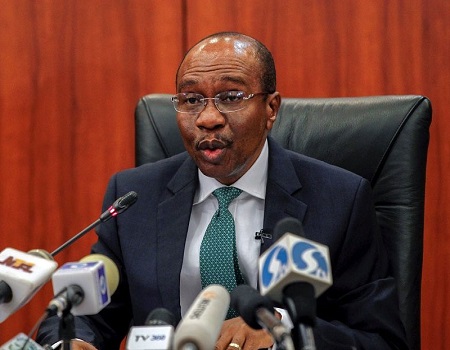[ad_1]
In order to discourage mass exodus, popularly called ‘japa’ of technology talents and other skilled workers from Nigeria, the governor Central Bank of Nigeria (CBN), Mr Godwin Emefiele, has called on organisations to adopt flexible work models and retrain their staff.
According to him, human capital is critical in driving Nigeria’s objectives as they remain the number one asset any country has.
Speaking at the second National Risk Management Conference organised by the Risk Management Department of the Central Bank of Nigeria on Thursday in Lagos, Emefiele said, “Despite the ‘japa’ movement, we still have high numbers of skilled workers ready and willing to put in the work required to move the country forward.
“Organisations will do well to attract and retain their staff by offering flexible hybrid work models if able, investing in employees’ wellbeing and mental health, and training them in skills required for the future. This is in addition to grooming the youth for leadership roles in the financial sector.”
He said the theme of the conference, ‘Risk management in the promotion of financial system development for economic growth,’ was quite apt and was a timely reminder of the importance of building collective capabilities to navigate the complex risks Nigerians are facing for the benefit of the country.
According to him, a lot has changed over the past two years as people adjust to life after a pandemic and addressing risks in the financial system was one of the most important tasks to be undertaken.
Technological disruptions experienced in the last decade have been forceful and impactful in all spheres of life. The rapid evolution of Fintech companies has continued to alter the financial landscape globally and developments have continued to disrupt traditional ways of offering financial services in the banking landscape, he stated.
According to Emefiele, business transactions and financial services are becoming more digitised and reliant on the internet. Alongside this, the extent of technology risks and the level of sophistication of cyber-attacks are rapidly expanding. Threats such as ransomware, targeted phishing attacks, etc, have become prevalent and could destroy the trust placed on financial institutions and OFIs.
This development has demanded that financial institutions, including OFIs, strengthen their cyber resilience and take proactive steps to secure their critical information assets to ensure their safety and soundness, Emefiele stated.
The gathering of eminent professionals from various institutions across the financial sector and other sectors of the economy was quite important because it provides a platform and a significant opportunity to engage with stakeholders on ways of enhancing risk management practices and building organisational resilience, he told participants.
Traditionally, Emefiele said, financial institutions have predominantly focused on financial risk, but have made efforts in rebalancing over the past decade to strengthen non-financial risk management.
However, over time, the lines between financial and non-financial risk have started to and would continue to blur.
“This is apparent when considering increased recent targeted cyber-attacks on critical IT infrastructure, the opportunities and risks presented by financial innovation driven by technological change (Fintechs), developments on the central bank digital currency, and our learnings from the recent response to the pandemic.
“Of course, we cannot leave out what we collectively face in terms of climate change – increasing flooding, desertification, droughts are some of the issues we will collectively have to address.
“We have felt the impact of the recent flooding in Lokoja and other communities and it is imperative that we know that the price to pay for not addressing climate change will be high as it affects every citizen, their livelihoods and their communities and this has dire economic and social consequences,” he stated.
Naturally, the tone from the top is critically important, and senior leadership must not only embrace their first line risk management responsibilities, leveraging the frameworks, policies and supporting toolset of the second line, but also continually foster a culture of risk awareness across its activities.
According to the governor, financial system development plays a huge role in promoting economic development through capital accumulation and technological progress, facilitating and encouraging the capital flows, as well as optimising capital allocation. Additionally, it reduces poverty and inequality by broadening access to finance to the poor and vulnerable groups thereby reducing their vulnerability to shocks and helps them increase investment and productivity that can result in higher income generation.
“At the Central Bank of Nigeria, our strategic focus, centred around the ‘people’, will act as a financial catalyst for job creation and inclusive economic growth of our country.
“We are continuously working to create an enabling environment that will drive both public and private sector participation in the real sector with strategic deliverables around price stability, job creation, financial inclusion, import substitution and accretion to the foreign reserves.
“We also seek to improve access to credit for households and businesses which will enhance productivity and create value across a wide range of economic activities,” he emphasised.
He also said the CBN worked with the fiscal authorities in instituting strong policy support measures capped under the Economic Sustainability Plan (ESP), which was designed to contain the effects of the pandemic, restore stability to the economy by helping households and businesses affected by the pandemic and to lift our economy out of the woods through massive interventions to critical sectors.
Under this plan, the monetary and fiscal authorities collectively mobilised and injected over N5 trillion to support households and businesses. The CBN deployed more than N3.5trillion, about 4.1 per cent of Nigeria’s GDP to critical sectors such as agriculture, manufacturing, electricity, and healthcare in order to stimulate and help the economy recover from the deep shock.
ALSO READ FROM NIGERIAN TRIBUNE
In the real sector, Emefiele said CBN has released the sum of N66.99 billion to 12 additional projects in manufacturing and agriculture, among others. Cumulative disbursements under the Real Sector Support Facility (RSSF) currently stands at N2.10 trillion disbursed to 426 projects across the country.
Under the 100 for 100 Policy on Production and Productivity (PPP), the bank disbursed the sum of N20.17 billion to 14 projects in healthcare, manufacturing, and services, bringing the cumulative disbursement under the facility to N93.39 billion to 62 projects. In the healthcare sector, N4 billion was disbursed to two healthcare projects under the Healthcare Sector Intervention Facility (HSIF), bringing the cumulative disbursement to N130.54 billion for 131 projects, comprising of 32 pharmaceuticals, 60 hospitals and 39 other services.
Under the Export Facilitation Initiative (EFI), the bank funded several commodity projects in the non-oil export segment for value-addition and production to the tune of N3.24 billion, aside the N50 billion disbursed through the Nigerian Export Import Bank (NEXIM).
In the Micro, Small and Medium Enterprise (MSME) sector, the bank supported entrepreneurship development with the sum of N39.26 million under the Tertiary Institutions Entrepreneurship Scheme (TIES), bringing the total disbursement under this intervention to N332.43 million, among others
[ad_2]








